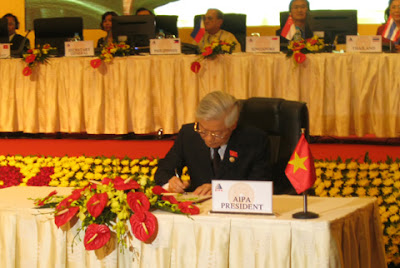http://www.atimes.com/
via CAAI
By Irwin Loy
PHNOM PENH - Questions hover over the future of Cambodia's political opposition, as well as room for dissent, in the wake of the conviction and sentencing of the exiled leader of the country's largest opposition party to 10 years in prison.
On September 23, the Phnom Penh Municipal Court convicted opposition leader Sam Rainsy on charges of disinformation and falsifying public documents. He was accused of fabricating maps that he claimed showed neighboring Vietnam had encroached on Cambodian soil - a politically charged subject in a country whose government has close ties to Vietnamese authorities, yet where centuries-old antipathy among the population also lingers.
The court's decision comes after a separate January conviction that saw Sam Rainsy sentenced to two years in prison after he uprooted a marker along a stretch of the border with Vietnam. He was convicted in absentia in both cases, living in self-imposed exile in France.
In an e-mailed response to questions on Thursday, Sam Rainsy said the charges against him were "of a strictly political nature".
"Only a kangaroo court can issue the type of verdict we saw today," he wrote. "Everybody rightly says that the judiciary in this country is everything but independent, being only a political tool for the authoritarian ruling party to silence any critical voices."
Yim Sovann, a spokesman for the Sam Rainsy Party, said the court ruling was an alarming sign that the government had grown increasingly intolerant of criticism. "The courts are being used as a political tool to crack down on the opposition party," he said. "It's a big step backward for democracy in Cambodia."
Thursday's ruling adds to lingering questions over whether Sam Rainsy will even be allowed to stand in the next parliamentary elections, scheduled for 2013. If the convictions are upheld, it would leave the Cambodian opposition without its leader and one of its most prominent members.
"The court issued a verdict to sentence Sam Rainsy. But it's not just Sam Rainsy. It sentences the whole country," Yim said. "The younger generation sees that when you stand up to protect your country, they will be tried like this. It sets a bad example."
If the court ruling means that Cambodia's opposition leader could not run in the coming election, it would cast doubt over the state of democracy in the country, said Koul Panha, executive director of the Committee for Free and Fair Elections.
"Cambodia endorses liberal, pluralist democracies," Koul said. "So the freedom to have different political opinions is very important. But now the case shows there are some political differences that are not tolerated. This will affect the full participation of the opposition parties."
He said he believed the court decision showed Cambodia's democracy was still "immature", 17 years after its first post-war elections. He said that while there had been a sharp decrease in political violence in recent years, battles were instead being played through the courts.
Authorities, however, reject accusations of political interference in the judicial system.
"This was a decision of the court," government spokesman Phay Siphan said of the ruling against Sam Rainsy. "We encourage the courts to do whatever the courts feel is just. We respect their sovereignty. Nobody influences them."
Instead, Phay said any blame for Sam Rainsy's predicament lay squarely on the opposition leader himself. "When you commit wrongdoings, you have to respect the rule of law," he said. "Like everyone, political opposition parties have to abide by the rule of law."
Rights groups, however, say the courts have increasingly been used as a means to silence opposition to the ruling Cambodian People's Party. Villagers protesting land disputes, rights workers, journalists and politicians have all faced problems with the legal system in recent years.
Parliamentarian Mu Sochua, a Sam Rainsy Party member, was convicted of defaming Prime Minster Hun Sen in 2009 after she had earlier accused him of insulting her.
Sam Rainsy has previously faced legal problems; he fled the country in 2005 after was stripped of his parliamentary immunity in relation to a defamation lawsuit. A court later sentenced him in absentia, but he returned after receiving a royal pardon and led his party to opposition status in the following election.
But it remains to be seen if he will be able to find a similar resolution to his current problems.
Ou Virak, president of the Cambodian Center for Human Rights, said it appeared the government was intent on trying to end Sam Rainsy's political career. "I think this government believes it can effectively stop Sam Rainsy from returning to Cambodia for good," Ou said. "It's a very clear, political move by the government to prevent Sam Rainsy from coming back and effectively weakening the opposition altogether."
Ou said he believed the government knew that international reaction to its jailing of a key opposition figure could be harsh.
By keeping Sam Rainsy outside Cambodia, any condemnation may be less severe than if he were imprisoned, Ou said. "The fact is he's out of the country. It's not like you have somebody in jail," he explained. "The government understands this. As long as Sam Rainsy remains outside, you're not going to hear too harsh criticisms from all sides."
(Inter Press Service)
















































